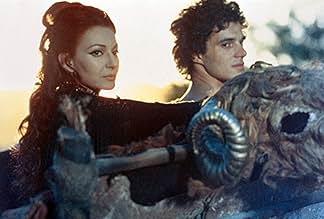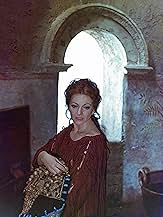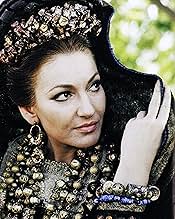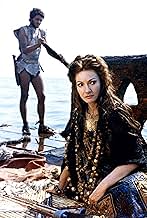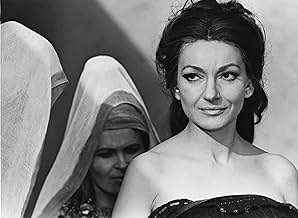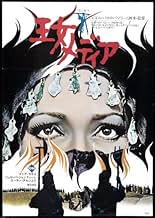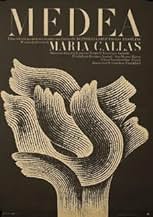ÉVALUATION IMDb
6,9/10
5,9 k
MA NOTE
Après avoir récupéré la Toison d'Or, Jason retourne en Grèce avec la puissante magicienne, Médée. Mais lorsque le Roi l'exile, Médée, furieuse, ourdit un plan pour se venger.Après avoir récupéré la Toison d'Or, Jason retourne en Grèce avec la puissante magicienne, Médée. Mais lorsque le Roi l'exile, Médée, furieuse, ourdit un plan pour se venger.Après avoir récupéré la Toison d'Or, Jason retourne en Grèce avec la puissante magicienne, Médée. Mais lorsque le Roi l'exile, Médée, furieuse, ourdit un plan pour se venger.
- Director
- Writers
- Stars
- Prix
- 2 nominations au total
Margareth Clémenti
- Glauce
- (as Margareth Clementi)
Annamaria Chio
- Wet-nurse
- (as Anna Maria Chio)
Avis en vedette
Being familiar with the story and Maria Callas, on the opera stage unrivalled as a singing-actress, were my main interests into watching Medea, having never seen a Passolini film before. I didn't love it, however I also didn't hate it, though I can see perfectly both viewpoints. I don't think Medea is a flawless film, some of the anachronisms did go over my head, the film due to some sluggish pacing can get dull at times, the centaur's monologue- though much of Medea is dialogue-free- goes on forever and gets tedious quickly and the way Jason's role is written and performed is too simplistic and rather amateurish. However, I did think it looked great, the locations are really unique and beautiful to look at and the cinematography gives a grim and surreal feel that actually suits the story. You can definitely sense that there is a sense of time and phrase, and it is quite clear here. The music is also incredible, it draws you right in, is very bold in orchestration and captures the atmosphere of the drama superbly. Passolini directs very assuredly on the whole, some scenes are evocatively savage and if there are any highlights they are Medea's mesmerising entrance and the genuinely frightening climax. The centaur is beautifully played, looking imposing and the relationship between him and Jason is the most convincing of the relationships between the characters. The main merit of Medea is Maria Callas' titular role performance, like she did on the opera stage with an intelligent, sensual and quite menacing presence she completely dominates every scene she appears in and is incredibly magnetic. Overall, more a film I appreciate but worth watching for Callas, the visuals and the score. 6/10 Bethany Cox
Pasolini began his revisiting of the old myths with "gospel according to St Matthews" ,perhaps the best rendition of Christ's life on the screen,then tackled the Greek legends ,first "Edipe Re" then "Medea".
"Edipe Re" was framed by a prologue and an epilogue which took place in this day and age."Medea" displays two worlds colliding:Jason's one,a rational world where science begins to surface,and Medea's one,which is that of superstition,magic, a world that is to disappear.The legendary Golden Fleece is nothing but an old rag.And Pasolini does not show the ending of the legend when Medea flies away on her chariot;it's neither a Hollywoodian film ,nor one of those peplums Italian directors used to make by the dozen ten years before.The centaur -played by earnest thespian Laurent Terzieff- ,the only concession to some kind of show,looks like an ordinary character.Some users pointed out the primitive side of the background.But let's not forget that there are two degrees:Medea's world is primitive to the core;Jason's one is attaining what we call civilization.
"Edipe Re" was framed by a prologue and an epilogue which took place in this day and age."Medea" displays two worlds colliding:Jason's one,a rational world where science begins to surface,and Medea's one,which is that of superstition,magic, a world that is to disappear.The legendary Golden Fleece is nothing but an old rag.And Pasolini does not show the ending of the legend when Medea flies away on her chariot;it's neither a Hollywoodian film ,nor one of those peplums Italian directors used to make by the dozen ten years before.The centaur -played by earnest thespian Laurent Terzieff- ,the only concession to some kind of show,looks like an ordinary character.Some users pointed out the primitive side of the background.But let's not forget that there are two degrees:Medea's world is primitive to the core;Jason's one is attaining what we call civilization.
This version of Medea, overall quite excellent, captures interesting aspects of the original piece. Familiarity with the story is necessary, though, and Passolini's story picks up a bit earlier than Euripides'. He runs through a stream of largely non-verbal sequences that establish a strong sense of place and emotional element that carry through the film. Classicists will enjoy the visual presentation of Iolkis, Chalkis, and their inhabitants -- though I still find it puzzling why the Argo is presented as little more than a raft; perhaps the budget was squandered on making a believable Centaur. Nonetheless, this film captures the mystical, religious, and passionate elements of Euripides' vision, and is highly recommended.
To win the kingdom his uncle took from his father, Jason must steal the golden fleece from the land of barbarians...
When the film opened up and we had the glimpse of a filthy centaur, I was pretty much sold that this film was going to be good, or at least unforgettable. The remainder may not have had as much magic, but it did not disappoint in originality... and cannibalism.
Typically when I think of Italian mythology films, I think of the "sword and sandal" films. This is not one of those. Rather than make the story all romantic and flashy, we get a world that is probably much closer to reality. Assuming that the event told in myth are many, many years BCE, it makes sense to show a much more primitive world than we expect. And in that sense, this film does not disappoint.
When the film opened up and we had the glimpse of a filthy centaur, I was pretty much sold that this film was going to be good, or at least unforgettable. The remainder may not have had as much magic, but it did not disappoint in originality... and cannibalism.
Typically when I think of Italian mythology films, I think of the "sword and sandal" films. This is not one of those. Rather than make the story all romantic and flashy, we get a world that is probably much closer to reality. Assuming that the event told in myth are many, many years BCE, it makes sense to show a much more primitive world than we expect. And in that sense, this film does not disappoint.
"Hell hath no fury like a woman scorned" describes Medea, whose hubris and amour fou for the bold and beautiful Jason leads to her downfall. Revered as a goddess by her own people, she betrays her own divinity and her race when she aids him to steal the sacred fleece, killing her own god-brother by decapitation during their escape. After bearing two sons to Jason in Greece, Medea is still not accepted and fails to adjust to Greek culture. The affection of acclaimed hero Jason strays and his ambition culminates in a betrothal to King Kreon's daughter. But when Medea learns of this betrayal and negation of her love and sacrifice her fury knows no bounds. She summons up the dark forces within her (she is a barbarian sorceress after all) for vengeance against those who have wronged her by killing Jason's sons, welcoming him with a false semblance of conciliation and acceptance while serving his dead sons to him for dinner. She sends two magnificent marriage cloaks to the king and his daughter who, when they don them, burst into flames. She then departs in rage leaving Jason to live with the results of the infamy he caused her enact through destroying her life. Maria Callas, in her only film, shows the famous range and subtlety she enjoyed as an opera star. Her fierce control and rage are memorable. Although this was a low budget film, it is extremely evocative and leaves lasting impressions. The sequence in the beginning when Jason was being tutored by the centaur Chiron about his destiny was very effective, and marked the innovative trick-photographic technique of melding man to horse to make it look very real and convincing. The primitive settings and human sacrifice of Medea's people helped to establish her dark, powerful and exotic barbarian character. English subtitles helped make up for the unfortunate dubbing. A strange and powerful version which holds it own against other interpretations.
Le saviez-vous
- AnecdotesFinal part of Pier Paolo Pasolini's "Mythical Cycle" also including Edipo Re (1967), Théorème (1968) and Porcile (1969).
- GaffesWhen Jason speaks to the two centaurs, there is a mismatch in their shadows in the middle of the screen, indicating that the image is a composite.
- Citations
King Kresus: You are a barbarian from a foreign land, different from us. We don't want you among us. It is impossible to see into the depths of one's soul.
- ConnexionsEdited into Spisok korabley (2008)
Meilleurs choix
Connectez-vous pour évaluer et surveiller les recommandations personnalisées
- How long is Medea?Propulsé par Alexa
Détails
Box-office
- Brut – à l'échelle mondiale
- 689 $ US
- Durée1 heure 58 minutes
- Mixage
- Rapport de forme
- 1.85 : 1
Contribuer à cette page
Suggérer une modification ou ajouter du contenu manquant


